Each year OIAF runs an annual pitching competition called Pitch THIS! in collaboration with Mercury Filmworks. The competition spotlights Canadian creators, giving them experience developing an animated series while also providing resources to help launch their projects.
This year semi-finalists of Pitch THIS! paired up with experienced series development mentors. Throughout the summer, these creators collaborated with their mentors to polish their 10-minute pitches, leading up to their live presentations at The Animation Conference (TAC) in September.
The 2023 Pitch THIS! winner was Beccs Champagne, a story supervisor at Atomic Cartoons, who pitched her project called Ghost Stories. We caught up with Beccs to hear about her experience participating in Pitch THIS!, what she learned from the competition and about the work that went into developing Ghost Stories.
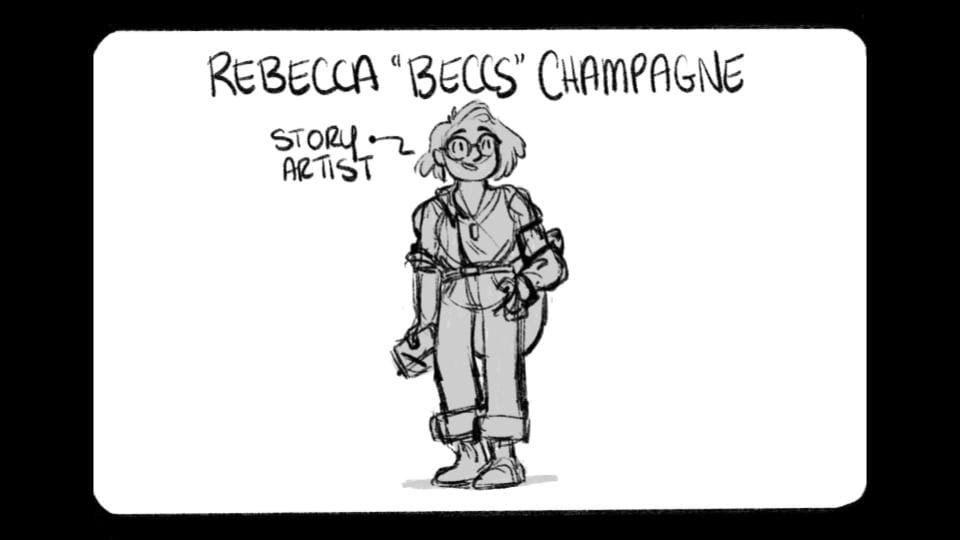
To begin, can you tell us about your career trajectory? How did you get into story, and what have been some major milestones of your career so far?
Beccs: I started out in animation as a Harmony builder in late 2011, and it wasn’t until I’d been doing that for several years that I managed to wedge my way into story work. I’d taken animation in college, and it hadn’t gelled with me in the way I hoped it would. I still loved animation as a medium, but the specific craft of animating wasn’t where my interests really lay.
I’d always been a comics and books person. I read a lot as a kid, teen and young adult. Storyboards felt like the right way to marry how interested I was in visual storytelling while staying within a medium I really adored.
Cory Morrison, of Big Jump Entertainment, gave me my first job as a story revisionist on their original show Shutterbugs. I didn’t have any experience other than some personal comic work, and all I did when anyone asked was talk about how I wanted to get into storyboards. Cory was really generous with his time, and on that project I took on story revisions work, proper storyboard work and even some animatic editing. It was a really great first job, and I’ll always be grateful for the opportunities I was granted.
I think I’ve been really lucky in my career so far, as most of the projects I’ve been on feel like highlights. Revisionist work on the first two seasons of Hilda was such a steep and exhilarating learning curve. Boarding on Hilda and the Mountain King felt like a graduation of sorts, the perfect opportunity to apply everything I’d taken in.
Shortly after that I got the chance to work on an adaptation of Kate Beaton’s work, Pinecone & Pony, which was a dream gig considering my love of comics and Beaton’s work in particular. Being able to fit in 1 episode of the last season of Hilda before I gave birth to my son was awesome, as it meant I’d participated in every season of the show. I’ve since taken on story supervision roles, my most recently completed project being season 2 of Teenage Euthanasia. It’s very different guiding a team instead of just doing the work yourself, and I find it equally rewarding.
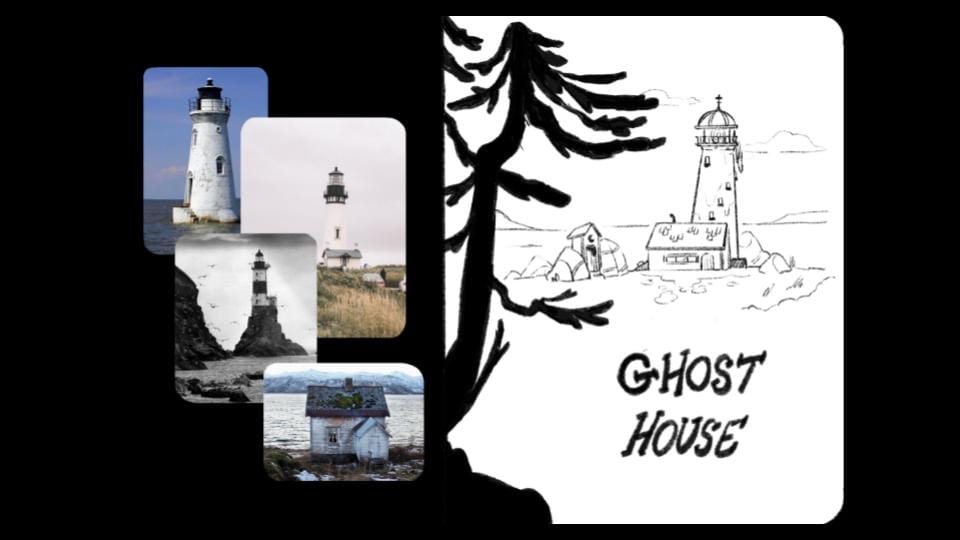
What is your favorite part of being a story artist, what do you love about this field within animation?
Beccs: Is it weird to say the responsibility? Haha! There’s a sense of authorship I get when I board an episode, and I really love taking into consideration all the decisions around cinematography and important acting moments that should come together to make an episode or short feel cohesive.
The collaborative elements of working with a script, the design team and getting a visionary heading from the director are what set apart story work from comics or novel writing for me. Story work can feel siloed at times, but I really enjoy working with other people.
Animation is a really flexible medium and we can tackle ideas in really unique ways because the audience’s suspension of disbelief is much easier to obtain than with live action.
Can you share a bit about what the competition is, and how you found out about it?
Beccs: Pitch THIS! Is a combination show pitch competition and mentorship program. Entrants submit their show ideas, 10 entries are selected (you can work in a team if you want to!) and then there’s a semi-final and final round to get to the winner.
I feel like I remember reading about it in the TAC/OIAF program every year, but it also always felt like a very intimidating process that was for other people to attempt. Mercury Filmwork’s social media posts about the competition did keep it on my radar in a way it hadn’t been before they got involved.
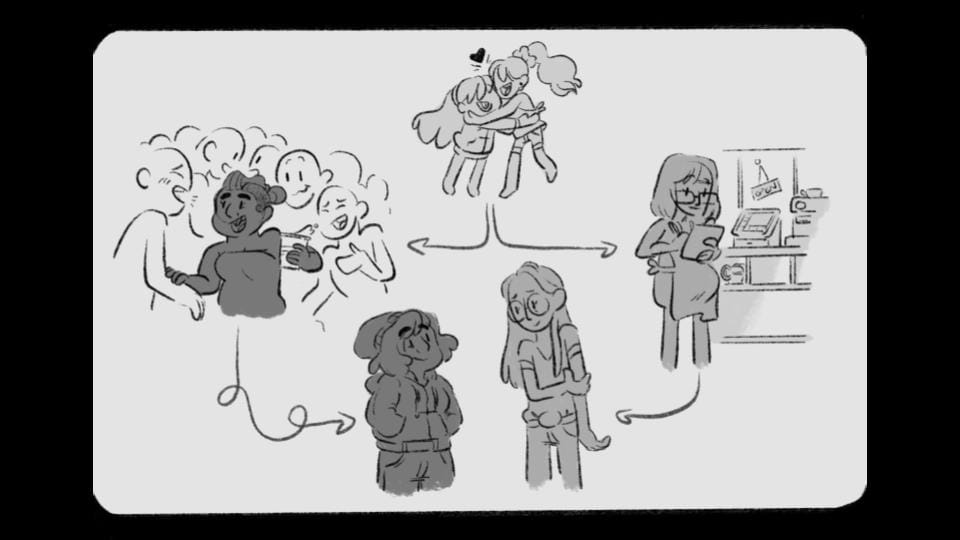
What inspired you to enter the pitching contest? What expectations did you have going into it?
Beccs: I’d taken a shot at pitching my idea internally at my current studio, Atomic Cartoons, and it hadn’t panned out (as these things often don’t!) so I’d already spent a bit of time trying to get the idea into shape.
Pitch THIS! seemed like a great chance to get that work in front of a lot more eyes. So many people out there have excellent ideas, I didn’t even think I would qualify when I applied! Truly all I was hoping for was the chance to get feedback from other professionals, since I’d mostly shown the idea to close friends up until that point.
Tell us about the experience of participating in the contest. What does each participant do throughout the Pitch THIS! process?
Beccs: The mentorship process is really the stand out feature of this competition. Each entrant gets several meetings with a mentor selected specifically for the type of project you are looking to develop. There are opportunities to flesh out the idea itself, as well as what the presentation should look like.
Pitching contests don’t provide as much time as a standard pitch meeting, so a lot of thought goes into finding the most efficient way to talk about your show. After that, you’re as ready as you’re gonna be! Everyone participates in the semi-final pitch round, and then two finalists pitch the following day.
You entered Pitch THIS! with Ghost Stories. What is the project about, and what inspired the story?
Beccs: Ghost Stories is an adult mystery/drama series centered around identity and community. It’s about moving back to your hometown and figuring out how to integrate who you are now with who everyone remembers you as. It’s about rekindling old friendships, and learning how to love each other as the complicated adults you’ve become. And it’s about avoiding your real problems by trying to help out some ghosts hanging out at the edge of town.
The series is inspired by my romantic attachment to the town I moved away from as a kid. And by wanting to do something familiar but slightly new with a lot of the ideas we have about ghosts.
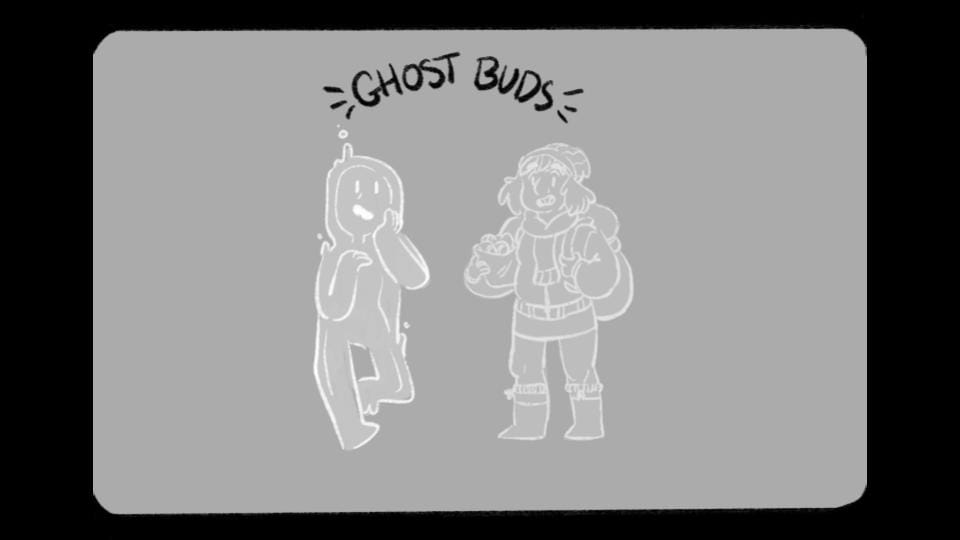
What mentor did you work with in refining your 10-minute long pitch? What lessons did you learn throughout the mentorship process?
Beccs: I worked with Casey Gonzalez, and they were so encouraging. Obviously you love your own idea, but I think it’s common to have a seed of doubt about whether it’s any good. Casey was extremely supportive about my goals with my project, and it was really bolstering to hear from someone who works with the types of shows I admire most.
She identified all the key questions executives usually have when taking pitches, and what’s the smartest order to give out information is. I think the very biggest thing I took away from my meetings with them was to be resolute about my ideas. I’m so thankful for the time I got to spend with Casey.
Tell us about how you prepared for your live pitch at TAC, and what the reception of your pitch was like?
Beccs: Honestly, I prepared frantically. From the discussions I’d had with my mentor, and some trusted friends, I knew there was value in conversational delivery. My presentation has a lot of slides, and I relied on them to prompt me on my talking points, so that I didn’t have to read off a page or memorize a script.
Shortly before each presentation I would read through the outline document that I kept on my phone, and then improvise the talk itself. I pitch storyboards as part of my job, but talking to an entire room of strange people with a big projector while standing at a podium was really stressful.
My hands were VERY shaky in the semi-final, and I tried to keep them behind the laptop. Once I’d gotten through it, the finals presentation felt a lot smoother to me (although following Paula didn’t put me at ease, her show is so charming).
The reception was so wonderful. Both juries were really receptive to the show, and there wasn’t much in the way of questions! Several people I really respect approached me throughout the conference to tell me how much they liked it.
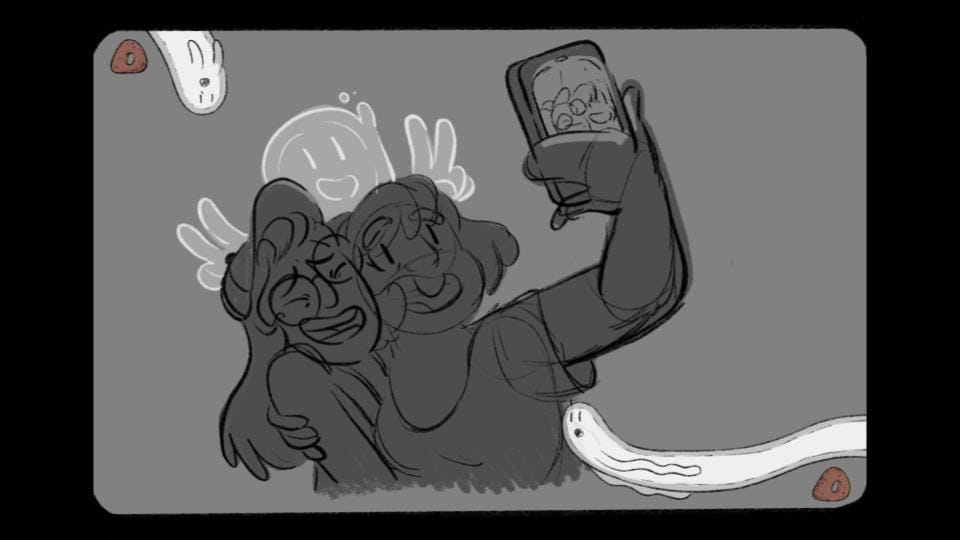
What was the most challenging aspect of participating in Pitch THIS, and how did you overcome it?
Beccs: My pitch was just too long. Even with how quickly I’m capable of talking, it was coming in at 12 minutes, and technically you don’t even get the full 10 minutes to talk! It needs to be around 8-9 minutes, so there’s room for the jury to ask questions at the end. I was deeply afraid of stumbling over key elements by trying to fit it all in.
It was a last-minute call that I didn’t run by anyone I’d been talking to up until that point: I cut out the last third of my presentation. If I made it to the finale I could tack that part back on, since you’re granted 5 additional minutes. My hope was that the questions I left the audience with were the “ooh I want to know more” kind and not the “what is she even trying to do here” kind.
What advice would you give to someone who’s interested in participating in Pitch THIS in the future?
Beccs: Go for it. Nothing ventured, nothing gained. Sometimes you just need a deadline to kick yourself into finishing something you’ve always wanted to work on. No matter how far you make it within the competition itself, all the work you’ll accomplish along the way will be worth it. As for your pitch itself – don’t be afraid to bring out your idea exactly as you imagine it. Specificity is easy to connect to when it’s also true.
What impact do you think your participation in the competition will have on your career in the future?
Beccs: Participating and winning has had a notable impact on me personally. It’s helped my confidence levels around my ideas. From a professional perspective, having won could potentially expand who might be willing to hear me out when I want to talk about Ghost Stories or whatever the next thing is (I know what the next things are, finding time to work on them is its own challenge).
I don’t know how much an experience like this will impact my career in the future, moving through the competition I never expected to make it to the next step. I’m excited to see what comes! I hope I can take advantage of it.
What’s next for Ghost Stories?
Beccs: We’re right in the middle of an industry downturn right now, so in the spirit of the project itself I’m going to try the community route. It won’t be a fast process, but next year I’ll start work creating a short as a proof-of-concept. The grant money and Toon Boom licenses that I won will be great resources to draw on for that.
Do you have exciting projects you’d like to mention?
Beccs: Ghost Stories is still the main project right now! Any news about it will be posted to my instagram page, which you can follow here.
Outside of that, I want to encourage any Ottawa locals to check out and submit to the 2024 Animation Show ‘n’ Tell! It’s an independent community event where we all get together to look at each others’ stuff. You’re encouraged to submit unfinished work, as long as it’s at a stage where you can show video. I’m doing my best to get something new together, and I’d love to see you there. Bring your friends! You can find more info on Instagram, here.
- Want to learn more about Ghost Stories? Be sure to haunt Beccs’ Instagram account.
- Interested in improving your skills for your next production role? Toon Boom Animation offers instructor-led training for animators, rigging artists, compositing artists and more.
The post Beccs Champagne on pitching Ghost Stories at TAC appeared first on Toon Boom Animation.
Courtesy: https://www.toonboom.com/beccs-champagne-on-pitching-ghost-stories-at-tac






